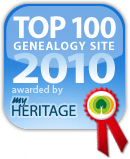There is, unfortunately, a dearth of information about Polish genealogy on the Internet.
Certainly there are websites that discuss the process of conducting research in Polish records, including information about the Partitions of Poland, online gazetteers, online historical maps, and information about surnames.
But, there are relatively few Polish pedigrees published on the Internet. There are even fewer images of original documents on the Internet. Subscription databases such as Ancestry.com have very few original Polish documents, the very documents that are critical to tracing one’s Polish roots.
And so, Polish genealogists must depend on the birth/baptism, marriage, and death records filmed by the Family History Library, in Polish archives, and in Polish parishes. The Family History Library, while constantly working to film and digitize Polish parish registers (including civil copies of those registers), still has a long way to go to complete the task of preserving those records and making them more readily available to researchers.
Many genealogists researching Polish roots must still contact the parishes where the vital and religious events were originally recorded in order to trace their ancestry.
The Polish Diocese of Płock has made things a bit easier for those researching records maintained in their parishes. Their website provides a great deal of information about the diocese (in Polish), and also has information on the individual parishes, including photographs and histories of the churches.
Fortunately for me, several of the parishes to which my ancestors belonged are in the Płock Diocese.
Going to the main page of the Diocese of Płock, browse down the left sidebar until you find the link for Znajdź Parafie (Find Parishes) . The next page that appears is a search form for the parishes in the Diocese. Enter the name of the parish in the box next to “nazwa parafii” (name of the parish) and click “szukaj” (search).
By entering the name “Krasne”, another page appears with all parishes with that name. Click on the photo, and you’ll be brought to the homepage for the parish in Krasne.
The homepage shows a photo of the current church and a history of the church in Polish. At the top of the page, you’ll find some basic information about the church, including the actual name of the church, the address, the dekanat (deanery), and the civil jurisdiction, including gmina, powiat, and wojewódstwo.
Krasne
parafia pw. św. Jana Chrzciciela
06-408 Krasne, Ludwika Krasińskiego 2
dekanat makowski
gm. Krasne, pow. przasnyski, woj. mazowieckie
Below that, you’ll find lots of useful information.
A list of the metrical books kept in the parish:
chrztów od 1825 r . (baptisms after 1825)
ślubów od 1825 r . (marriages after 1825)
zgonów od 1891 r . (deaths after 1891)
The names of the priests at the church:
proboszcz ks. kan. Remigiusz Sęderski, od 1984
wikariusze ks. Andrzej Rutkowski, od 2006
A list of the villages served by the parish:
Augustów, Brzegędy, Filipy, Gawary, Gawronki, Helenowo, Kozin, Krasiniec, Krasne, Kulki, Kurowo, Kurówko, Łyszkowo, Mosaki, Nowa Wieś, Rukle, Ruszczyny, Szczuki PSK, Szczuki Wieś, Szlasy, Tabuły, Wężewo, Zalesie, Żbiki
Sure enough, there are two of the villages of my ancestors: Mosaki and Rukle.
So now, if I want to travel to the parish to view the metrical books, I know the address of the church, the villages included in the church books, and the years covered by those books. I even know the names of the priests, so that I can contact them directly. By clicking on the name of the priest, I even get his telephone number!
While the parish in Krasne has metrical books that go back far enough in time to be useful for my research, the same is not true for all parishes. The parish in Pałuki, only has books for:
chrztów od 1918 r . (baptisms after 1918)
ślubów od 1928 r . (marriages after 1928)
zgonów od 1928 r . (deaths after 1928)
The books available at the parish in Szwelice are even more limited:
chrztów od 1945 r . (baptisms after 1945)
ślubów od 1945 r . (marriages after 1945)
zgonów od 1957 r . (deaths after 1957)
While this is not particularly good news for me, since my ancestors lived in both the Pałuki and Szwelice parishes, I now know that I’m not likely to obtain any records for my ancestors directly from those parishes. In fact, I may not even get a response if I write to the parish. IÂ have to look for those records in the diocesan or civil archives.
Every diocese in Poland does not have such useful websites. Still, it’s useful to search for a diocesan or parish website to see what information they do provide.
Copyright © 2008 by Stephen J. Danko




Truer words were never spoken. Those of us researching Polish ancestors are very dependent on the FHC films when and where they’re available. I’m fortunate in that the FHC has filmed at least some of the records in each of my ancestors’ parishes. But they haven’t filmed them all. So I’ve still had to write to the parishes for information. Finding them and information about them is invaluable.
It’s been interesting for me to watch the technological progress made in the various dioceses in Poland over the last 10 years. There are so many more websites available now! Not only do the dioceses have websites but some of the individual parishes have them too. And they’re pretty darn impressive!
My problem of course is that few parishes have English versions of their web sites. Oh to be able to read Polish… hopefully in my next life 😉
Oh and I wanted to mention that I had trouble getting to your blog from my feedreader (Google) today. The hyperlink/title of your post took me to Feedburner’s site and the title of your blog isn’t hyperlinked at all. I’m not having this problem with anyone else’s blog so it might be something on your end.
This is good news for those of us with Polish roots, since presumably more is to come in the next years. (My roots are in SE Poland/Galicia/Ukraine – Jaroslaw, Przemysl and Rozwadow – etc).
Steve,
I agree – it’s so difficult. I just spent months going back and forth with the Polish National Archives to get one baptismal record. The PÅ‚ock site sounds like it has a lot of info, but if you need the name of the church to search doesn’t that make it all the more difficult. I tried entering the town name in various search boxes with no luck…unless I am mistaken and the church doesn’t belong in that diocese!
I’m glad you post records on your site…while we have ancestors from different areas, it’s still nice to see examples since it helps you decipher handwriting better with the more you try.
Donna
Thanks for posting this, Steve. This site has confirmed for me that the parish for Szulmierz (you have posted about it on my behalf before) is indeed Koziczynek. Fortunately, the records for this parish are available all the way back to 1660.
Thank you for your very helpful article. I have found the address for the parish that I need and they should have one of the records I want. How do I proceed with making a request in terms of how much money to send and in what form and return postage? Thanks.
Witam, kiedyś już pisałam komentarz na twym blogu.
Pochodzę z Ruszczyn. Chciałam uściślić nazwisko występujące w jednym z dokumentów. W Ruszczynach mieszkała (i nadal mieszka) rodzina Chmielińskich (Chmieliński, a nie Chmialiński).
My grandfather and three of his brothers came to the US shortly after 1900. We have an English translation of a letter from a brother named Henryk who remained in Poland. At the top of the translation, it says “Ruszczyny” and a date in 1947.
The four brothers each spelled their surname differently: Chmielinski, Chmelenski, Chmielewski, and Mieleski.
How would I find out if Henryk was part of the Chmielinski family that remains in Ruszczyny? I would also like to find information on the ancestry of my grandfather and his brothers. I know their birth dates, but the information varies from document to document. I also know their parents’ first names.
Thank you for any suggestions.
I’m trying to locate the parish that would cover the town/village of Wola Keczewska in the Province of Mazowieckie where my father was born. Any help would be greatly appreciated.
Raymond,
The parish for Wola KÄ™czewska is Lipowiec KoÅ›cielny – parafia pw. Å›w. MikoÅ‚aja (the Parish of St. Nicholas in Lipowiec KoÅ›cielny).
http://tinyurl.com/4t4p7rk
Best regards,
Steve
The only information I have regading my grandfather’s place of birth is “Dobrzen, Plock, Russia” 1873 or 1874(difficult to read the last digit). This was on his declaration of intention for naturalization which, unfortunately, he did not pursue. I e-mailed the Archives of Plock and received an e-mail reply which I cannot open for some reason. Could anyone possibly help me if I email their response? I have the feeling it is probably just referring me to the Diocese of Plock and I don’t have any information as to a parish so I may have hit a brick wall (again). Also the link to the Plock Diocese does not work for me. Can anyone please help?
Hi Steve,
I just received your reply, however, I just discovered that my last name is spelled
“Fraczkowski”. This was discovered by a woman from Warsaw who is doing research
for me. She just informed me that upon going to Lipowiec Koscielny she was informed she will have to go to Polck to obtain any info on my grandparents.
Thanks again for your reply.
Seven or eight years ago, a cousin and I visited Gostynin, the town our grandparents left in 1909. With local help, we were able to get a birth certificate for the last sibling born there before emigration. Certificates for the rest of the family, we were told, had been sent to Plock after 100 years, and would be available there. Time was a premium, so we weren’t able to search further. Boo Hoo. Is this the area you mention that is in the Plock Diocese? Do you know the church in Gostynin? (These civil records are in Russian so even if I could read Polish it would be of little help.)